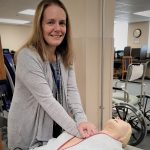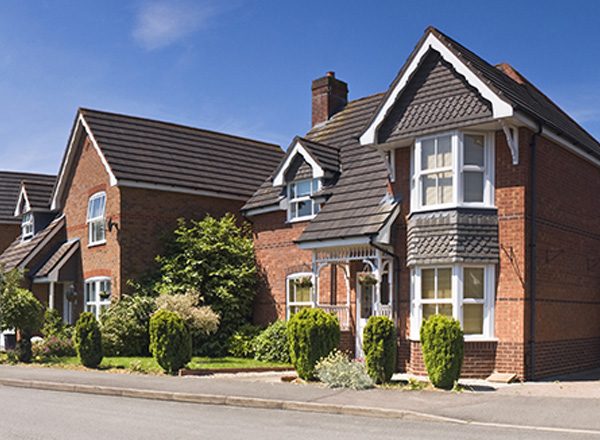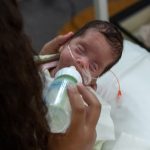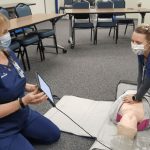You might think it unusual that a psychiatric nurse who primarily sees patients via telemedicine would possess the advanced skills needed to revive a cardiac arrest patient. It would be even more remarkable if that nurse had never performed CPR on a patient and never expected she’d be called upon to do so. But that’s exactly what happened on a recent Sunday morning in her quiet residential neighborhood in Murfreesboro, Tenn.
Medical emergency rattles Sunday morning calm

Elizabeth Priestley
Elizabeth Priestley has been a psychiatric nurse practitioner for 18 years, with the last four at the Veterans Administration’s (VA) Tennessee Valley Healthcare System. The usual morning serenity of Elizabeth’s suburban neighborhood was disrupted when her son ran into the house saying that Dad needed her. She calmly walked toward the door when her son exclaimed, “No, Dad was running into the neighbor’s yard! He said it’s important!”
Darting down the street, Elizabeth saw her husband and other residents gathered around a neighbor (whom we’ll call Bill) who lay motionless on the ground as his son called 911. Elizabeth sprang into action. She immediately assessed the situation: no breathing, no pulse. Elizabeth recalls not hesitating even for a moment before starting CPR.
Hospital’s CPR improvement program just kicked in
The Veterans Health Administration (VHA), keeping with its mission of High Reliability and I Care core values, has committed to delivering high-quality CPR to all veterans by implementing the Resuscitation Quality Improvement® (RQI®) program at its VA facilities nationwide. Adhering to the mission and values, the Tennessee Valley Healthcare System requires its staff members to participate in the quarterly CPR program, even if serving in a nontraditional clinical role.
Elizabeth, falling in the nontraditional category, has participated in RQI since 2018. “It was like riding a bike as I performed CPR,” she says, “because of my frequent training at the VA.”
“I could hear the program counting in my head with that computer voice the whole time,” says Elizabeth, referring to the RQI simulation station used for skill assessment.
“I knew how hard to push down and how far. I was thinking about making sure to go deep enough while allowing time for recoil. I was remembering the head tilt, watching for the lungs to fill, the whole shebang! I can guarantee you I would not have remembered all of that with a CPR course only every two years.”
“You don’t even think of COVID”
Elizabeth performed a combination of chest compressions and mouth-to-mouth breathing on Bill. She didn’t think twice about performing rescue breaths.
“When you’re in the moment, you just don’t even think about COVID. I began compressions, and he kind of started spontaneously breathing some... so, I didn’t have to do as many mouth-to-mouths.” Paramedics arrived quickly, used an AED to restore normal rhythm to Bill’s heart, then whisked him to the hospital.
When Elizabeth visited him in the hospital, Bill expressed, “We just don’t know what to do. How can we thank you?” Elizabeth responded, “You don’t have to thank me. That’s what I’m trained for.”
Improving survival rates one patient at a time
According to the American Heart Association*, the national average for surviving an out-of-hospital cardiac arrest emergency like the one Bill experienced is only 10.4%! While Elizabeth shies away from praise, she’s just thankful she was there and knew what to do. She admits that, in the past, she and her fellow workers sometimes felt inconvenienced by the frequency and intensity of the quarterly CPR program, but she now understands its importance.
“Had it not been so repetitive, I would not have been prepared. Like a foreign language - if you don’t practice it frequently, you forget,” Elizabeth stated.
Elizabeth wants to give a big shout out to the VA and RQI Partners for such an effective CPR competence program. “Without RQI, I probably would not have performed the compressions so effectively. I don’t think I would have gone as deep or been cognizant of recoil. I would have been afraid to break a rib and probably would’ve done more superficial compressions.”
An all-around good outcome
Elizabeth reports that Bill, whom she describes as in his fifties, is home and doing well. While they previously knew each other peripherally, their families have since become good friends. “I check in on him occasionally,” she says. “And my husband does as well, and we know his wife and kids now.”
Elizabeth agrees that the neighborhood residents have become closer since Bill’s emergency. Another positive outcome? Her two sons, who witnessed their mom’s lifesaving actions, have been inspired to learn CPR, too.
Currently, the VHA has nearly 111,000 providers enrolled in the RQI program systemwide. They join the thousands of staff at over 850 U.S. civilian hospitals using RQI to verify their competence in providing high-quality CPR to sudden cardiac arrest patients.
"We would like to thank the VHA for committing to delivering high-quality CPR and cardiac care to our Veterans across the nation. Congratulations to Elizabeth for her quick action in helping carry out our shared mission of saving more lives from sudden cardiac arrest, right in her own community!” says Brian Eigel, Chief Operating Officer of RQI Partners.
*Heart Disease and Stroke Statistics—2020 Update: A Report From the American Heart Association









